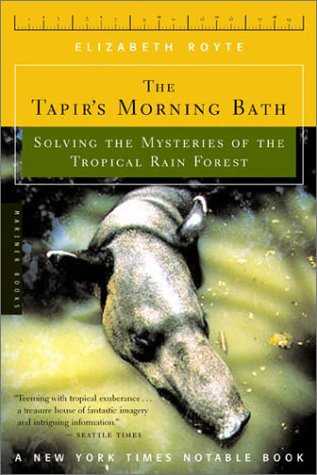 The Tapir’s Morning Bath
The Tapir’s Morning Bath
Solving the Mysteries of the Tropical Rain Forest
Praise
The New York Times Book Review named Tapir a Notable Book of 2001 and said, “Royte is a remarkable writer. Her book is a charmer; I loved it.”
E.O. WILSON liked Elizabeth’s book. This is what he said about it: “With the eye of an anthropologist and a journalist’s skills, Royte penetrates the world of the tropical biologists to explain their culture, passion, and above all their uniquely valuable work. As an exact and endearing chronicle, this book will have enduring value.” BILL MCKIBBEN added that The Tapir’s Morning Bath“is as droll as it is moving, as fascinating as it is lighthearted. Equal parts GERALD DURRELL and Scientific American, it deserves a wide audience.”
The New Yorker: “In this mischievous report on Barro Colorado Island, a six-square-mile nature preserve in the middle of the Panama Canal, the tropical biologists who study the rain forest become themselves subjects for inspection and analysis. The author is a journalist, not a scientist, but she gamely tags along with researchers as they pursue spider-monkey dung and doctoral degrees, while stealthily collecting her own data on Homo academicus and its mating habits in the wild. Inevitably, though, she’s distracted from the humans by the island’s more exotic species: iridescent bees as big as gumballs and enterprising bats who construct tents out of heliconia leaves. By turns comic and poetic, the book delivers the pleasures of a long, meandering excursion, in which the act of observing is its own reward.”
About the Book
One hundred and fifty years ago Charles Darwin asked how a rain forest could contain so many species: “What explains the riot?” The same question still occupies the scientists who toil on Panama’s Barro Colorado Island. Tropical and steamy, these six square miles comprise the best-studied rain forest in the world, a locus of scientific activity since 1923. In The Tapir’s Morning Bath, Elizabeth Royte weaves together her own adventures on Barro Colorado with tales of researchers struggling to parse the intricate workings of the rain forest, the most complicated natural system on the planet. Through the lens of the field station, she also traces the history of modern biology from its earliest days of collection and classification through the decline of the naturalist to the days of intense niche specialization and rigorous scientific quantification. As Royte counts seeds and sorts insects, collects monkey dung and radiotracks bats, she begins to wonder: what is the point of such arcane studies? The world over, rain forests are rapidly disappearing and species are going extinct. While humanizing the scientists in the field, she explores the tension between their research and the reality of a world that may not have time for the answers.
Hardcover 328 pages Buy the book
Softcover (pictured) 336 pages Buy the book